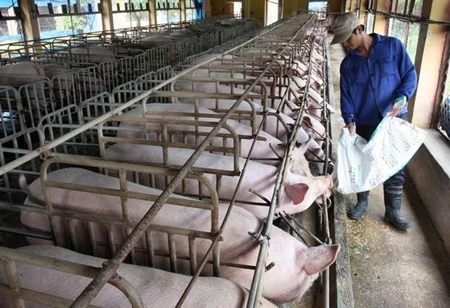 An employee at Tien Giang Fruit and Vegetables Company loads pineapples for processing. (Photo: VNA)
An employee at Tien Giang Fruit and Vegetables Company loads pineapples for processing. (Photo: VNA) Vietnam’s foodstuff sector has encountered a spectrum of challenges in an attempt to gain a firm foothold in the domestic market due to the flood of foreign commodities.
Statistics released by the Ministry of Industry and Trade showed that Vietnam’s food consumption from 2011-2016 increased by 5.1 percent annually to an estimated 29.5 billion USD.
It is forecast that each Vietnamese citizen will spend about 5.8 million VND (255.2 USD) on food in 2016, the ministry said.
Business Monitor International, an independent provider of country risk and industry analysis specialising in emerging and frontier markets, projected that Vietnam’s food and beverage consumption will grow at a double-digit rate by 2018.
Despite the country’s strong demands and great production capacity, domestic food is facing fierce competition from imports such as fruits, beef, mutton and poultry available on Vietnamese supermarket shelves.
According to the General Department of Vietnam Customs, Vietnam imported 39.1 million USD worth of chicken from the US in the first half of this year, making up more than 60 percent of the country’s total chicken imports.
Other chicken import markets Vietnam has targeted included Brazil and the Republic of Korea, the department said.
Dinh Thi My Loan, President of the Association of Vietnamese Retailers, said bottlenecks lie within both production and distribution, especially food quality and hygiene safety.
Lax coordination between producers, processors and distributors coupled with poor infrastructure and logistics services have raised local food prices and weakened product competitiveness.
Tax barriers lowered or removed as part of World Trade Organisation (WTO) commitments and free trade agreements have also put pressure on domestic businesses.
Ta Van Tuong, Director of the Hanoi Husbandry Development Centre, said hi-tech agriculture in Hanoi has shown a lot of shortcomings such as limited investment capital, weak workforce and loose contact between farmers.
Along with weaknesses in production and unclear market views, high taxes and husbandry costs have contributed to reducing the competitive edge of Vietnamese food, he said.-VNA





















